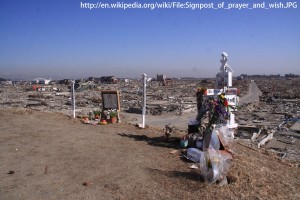English
Over two months have passed since the massive quake and tsunami devastated the coastal area of the Tohoku region, followed by the nuclear crisis at the Fukushima plant. More than 15,000 people perished, with close to 9,000 still missing and over 100,000 evacuated to temporary shelters. Witnessing this catastrophe unfolding was a powerful reminder of how vulnerable we humans are to the forces of nature. While feeling deep compassion toward the victims of the disaster, I cannot help but appreciate the life I have no matter how difficult things may be sometimes. In the face of this catastrophe, we are all challenged to live our lives to the fullest, doing whatever we can to the best of our capacity. What one can do may be minuscule in the total effort to reconstruct the whole Japanese economy, as well as the disaster-stricken area. However, when we all make our share of efforts, regardless of the nature of our challenge, we will pull out of this hardship as a nation.

This disaster also reaffirmed that we are part of a global community, ensuring that English as an international language will play an ever more important role. Relief operations brought over 20,000 American service members and other personnel to the disaster-stricken area under the “Operation Tomodachi.” Their efforts being highly appreciated, I heard that many Japanese aid workers working hand-in-hand with foreign personnel had great difficulty with communication, which ended up hampering their operation. I also heard that some foreign residents decided to remain in the area to help locals, in the hope of giving back to them the hospitality they had received. Mr. Donald Keen, a prominent scholar of Japanese literature, even made the noble decision to make Japan his permanent home as a naturalized citizen to be with the Japanese people in this time of difficulty. Many people worldwide through grassroots operations sent us both donations and compassionate messages. English certainly has a place for us to interact with other nations and their people.
As learners of English, we should continue to challenge ourselves, striving to develop our communication skills to meet what is expected of us to function in this rapidly globalizing society. We should not remain insular, but be equipped with the capacity to internalize world affairs as well as domestic, to survive in cooperation with the global community. With our ingenuity, resilience and hard work, we will be able to turn this disaster into an opportunity to strengthen our solidarity as a nation and lay strong foundations to rebuild our economy . Now is the time to meet the challenge head-on and move forward.
日本語
東北地方の沿岸地帯が、巨大地震と津波により壊滅され、次いで、福島原発事故が起きてからもうすでに2か月以上が経った。 15,000人以上が死亡、9, 000人近くが行方不明、100,000人以上が避難所生活を余儀なくされている。 この大災難は、立ちはだかる自然の猛威のまえに、私たち人間が いかに脆い存在であるかを思い知らせた。 犠牲となられた方がたには、深い哀悼の意を表すると共に、生ある者はいかに困難な状況があろうとも、今ある命に感謝するものである。 この大災害に直面し、私たち皆が、能力の限り精一杯生きてゆくことが求められている。被災地の復興、しいては日本経済を立て直すという取り組みにおいて、一個人が出来ることなど微々たるものかもしれない。 しかし何にせよ、皆が努力の一環を担う時、国家一丸となってこの苦難を乗り切ることができるであろう。

この災害は、私たちが国際社会の一員であることを再確認させるものでもあった。 そこでは国際語としての英語がこれまで以上に重要な役割を担うこととなる。 「オペレーション友達」の名のもとに、米軍から2万人以上の人員が 被災地の救援活動に携わった。この活動には心から感謝しているのだが、外国の救援隊と協力して救助活動に携わっていた多くの日本人は、コミュニケーションをとるのが困難で、そのことで、救援活動に支障がでることもあったと聞いた。 また外国人の中には、これまで地元の人たちから受けた親切の恩返 しをしたくて、被災者を援助するために地元に留まる決心をした人もいるということだ。 日本文学研究の学者として著名なドナルド・キーン氏は、この苦難の時に被災者との連帯を示すため、日本に帰化し、永住するという決心をした。 世界中 の人々が草の根活動を通じて、寄付金や心温まるメッセージを送ってもくれた。 英語は、私たちが 諸外国とその人々と交流を図る際に不可欠である。
英語の学習者として、私たちはこの急速に国際化している社会で機能するため、必要とされることに対応できるだけのコミュニケーション能力を培う努力を続けなくてはいけない。 国際社会と共存するためには、島国気質ではなく、国内の事柄のみならず 世界の出来事を自分たちの事柄として考えることのできる能力を備えていなくてはいけない。 私達の持つ創造力、粘り強さ、勤勉さは、今回の災難を、国の団結を強め、経済を立て直す強い基盤を築くための機会に変えることができるであろう。 今こそ、真っ向からその挑戦を受け、前進する時である。


